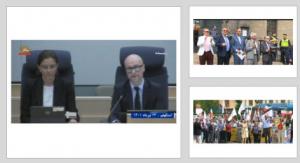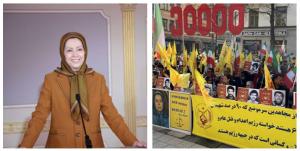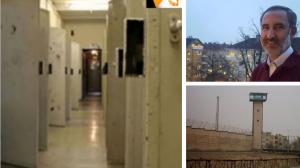
On Thursday, July 14, 2022, a court in Stockholm, Sweden, declared its final verdict on the case of Hamid Noury, an ex-prison official in Iran’s Gohardasht prison who was involved in the execution of political prisoners he was sentenced to life imprisonment.
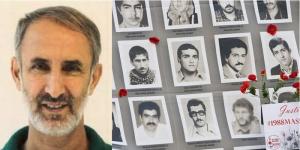
Noury was tried for his role in the massacre in the summer of 1988 of 30,000 political prisoners, 90 percent of whom were members and sympathizers of the People’s Mojahedin Organization of Iran (PMOI/MEK).
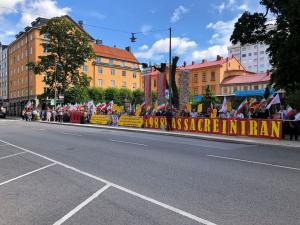
During the trial of Hamid Noury, which lasted over nine months and 92 sessions, many survivors, witnesses, and relatives of the victims of the 1988 massacre gave harrowing accounts of the atrocities committed in Iran’s prisons.
Noury initially claimed that he had been mistaken for another person. He denied his involvement in the 1988 massacre and denied that such killings took place.
Noury was tried for his role in the massacre in the summer of 1988 of 30,000 political prisoners, 90 percent of whom were members and sympathizers of the People’s Mojahedin Organization of Iran (PMOI/MEK).
The court sentenced Noury to life in prison for committing serious crimes against international law and murder.
During the trial of Hamid Noury, which lasted over nine months and 92 sessions, many survivors, witnesses, and relatives of the victims of the 1988 massacre gave harrowing accounts of the atrocities committed in Iran’s prisons.
As the court prepared to declare its verdict, a large crowd of supporters of the National Council of Resistance of Iran (NCRI) had gathered to commemorate the many victims of Iran’s regime and call for justice and an end to the impunity that regime officials enjoy for their many crimes.
Just recently, Hossein-Ali Nayeri, one of the members of the notorious “death commission,” a group of so-called judges that sent thousands of prisoners to the gallows after kangaroo trials, brazenly defended the 1988 massacre and said that had it not been for those executions, the regime would not be standing today.
According to many press reports, senior regime officials, including regime president Ebrahim Raisi, were directly involved in the 1988 massacre. Iranians are hoping that Noury’s trial will set a precedent to indict other regime officials and put them on trial, Iran observers are saying.
Mrs. Maryam Rajavi, the President-elect of the National Council of Resistance of Iran (NCRI), welcomed the conviction of Hamid Noury and called it “a first step in the path of full justice.”
She added: "Comprehensive justice, of course, will be achieved when the main perpetrators of the crime, especially Ali Khamenei and Ebrahim Raisi, and other perpetrators, are put on trial in the courts of a free Iran or international tribunals. The extensive legal, political, and informative campaign of the Iranian Resistance in the past 33 months and the verdict handed down by the court defeated the Ministry of Intelligence’s conspiracy and its agents to divert the Justice Movement against the MEK."
"The strong testimonies and convincing documents of the witnesses and plaintiffs, especially in Ashraf 3, played a decisive role in proving Noury’s guilt and prevented him from evading justice. In fact, the trial would have turned out differently if some of the court sessions had not been held in Albania," NCRI President-elect added.
Background
Noury was arrested during a trip to Sweden and was put on trial based on the Universal Jurisdiction principle. He had dozens of plaintiffs who gave testimonies in the Swedish court. A part of the trial was held in Durres, Albania, where members of the MEK in Ashraf 3 testified about the crimes of Noury and other regime authorities.
Noury initially claimed that he had been mistaken for another person. He denied his involvement in the 1988 massacre and even denied that such killings took place.
In the summer of 1988, under a fatwa from regime supreme leader Ruhollah Khomeini, Iran’s prisons were purged of all political prisoners. More than 30,000 prisoners were hanged in the span of a few months, most of whom were members and supporters of the People’s Mojahedin Organization of Iran (PMOI/MEK).
The prisoners were secretly buried in mass graves and their families were kept in the dark. The MEK warned about the massacre of political prisoners in the early days of the killings, sending letters to the UN, Amnesty International, and other human rights bodies.
But the issue was ignored for more than three decades. Noury’s trial gave the witnesses and survivors a chance to tell the world about the atrocities that took place in Iran’s prisons in those years.
Witnesses spoke of the “death room” and the “death commission,” where prisoners were sentenced to death if they simply refused to disavow their support for the MEK. Many witnesses spoke of the “death corridor,” the dark hallway where prisoners were kept waiting for hours before being killed.
The prisoners gave horrific accounts of the “death hall,” where dozens of prisoners were hanged while others watched and waited their turn.
Shahin Gobadi
NCRI
+33 6 61 65 32 31
email us here


